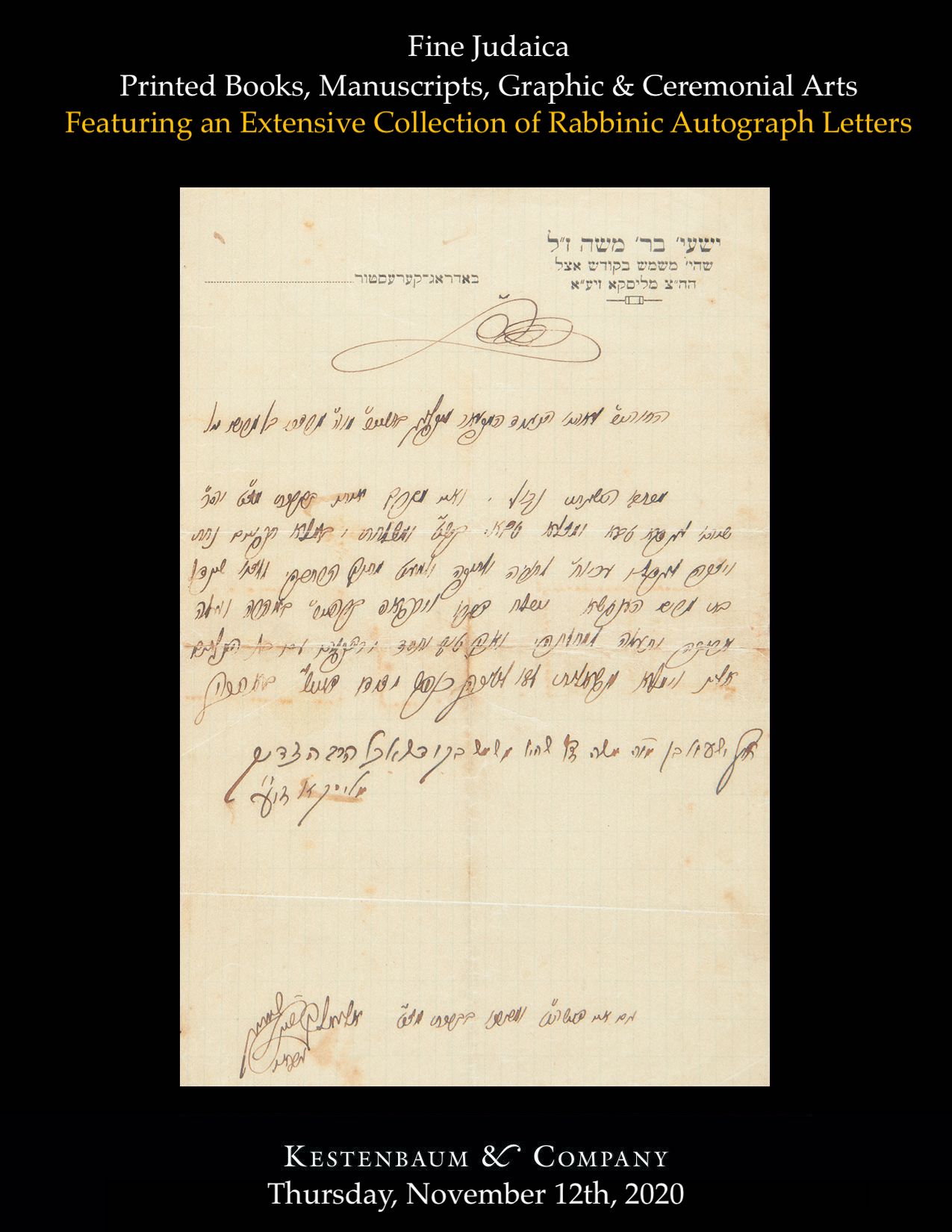Mordecai, Jacob (1762-1838). Autograph Manuscript, written in English (with some Hebrew): Collected articles, all of a religious and philosophical nature. Approx. 120 pages.

Auction 91 |
Thursday, November 12th,
2020 at 1:00pm
Fine Judaica: Printed Books, Manuscripts, Graphic & Ceremonial Arts Featuring an Extensive Collection of Rabbinic Autograph Letters.
Lot 117
(AMERICAN-JUDAICA).
Mordecai, Jacob (1762-1838). Autograph Manuscript, written in English (with some Hebrew): Collected articles, all of a religious and philosophical nature. Approx. 120 pages.
(Richmond, Va.): 1820’s
Est: $15,000 - $20,000
PRICE REALIZED $14,000
Of these manuscripts, some are complete essays, others are fragments or single pages on various topics which interested Mordecai. For example, one essay is eight pages on Scriptural synonyms for the afterlife (i.e she’ol, gehennom, tofet) as interpreted by both Christianity and Judaism, in which Mordecai uses terms such as: “Christians say” and “we answer.”
Many of these essays are not the typical writings of a traditional Jew as Mordecai was, as they are strictly analyses of the Bible without reference to rabbinic writings. However, another manuscript includes Mordecai’s “Remarks on the Typical Chapter introductory to Maimonides’ More Nevochim,” on James Townley’s essay “The Typical Character of the Mosaic Institutions” in his “The Reasons of the Laws of Moses: From the "More Nevochim” (London, 1827).
Jacob Mordecai (1762-1838) was the founder of the Warrenton Female Academy in Warrenton, North Carolina, making him thus a pioneer in women’s education in the United States. “Strange as it may seem, hundreds of Southern girls received their education during the early part of the last century, at a non-sectarian seminary conducted by a Jewish family,” writes Herbert T. Ezekiel and Gaston Lichtenstein, still scarcely able to believe it (“The History of the Jews of Richmond from 1769 to 1917,” Richmond, 1917, pg. 23).
Having been unsuccessful in commercial pursuits, but deemed an intellectual and a solid citizen of good character by his neighbors, Mordecai was asked to open his boarding school, which he did in 1809. Apart from good Southern citizen and educator Mordecai had another, more private life: he and his family were religious Jews, observant even as the only Jews in many miles. He was also a scholar of religion, intensely investigating the claims of Christianity and refuting them in favor of Judaism using what little tools he had at his disposal.
In 1818, after Mordecai’s academy closed, he moved to Richmond, VA and joined its small but thriving Jewish community. A young friend of his from that period gives us a look at how he was perceived by the Jewish community: “Mr. Mordecai was always much admired on account of his brilliant intellect, being well versed in Biblical research, the Hebrew language, and its literature; in fact, he was considered authority on many questions pertaining to Judaism and Biblical interpretations. I always found him very genial in his deportment, and we became so much attached to each other that I felt it a pleasure to visit his home on Church Hill on Sabbath afternoons, and this became one of my weekly resorts. It is evident that Mr. Mordecai must have been a profound scholar, from the fact of the vast amount of manuscript it is said he left after his death and which I trust may be placed in the hands of a competent person for examination and preservation.” (Jacob Ezekiel, “Pleasing Incidents in Jacob Mordecai's Life,” The Jewish South, April 8, 1898, p. 4.) Ezekiel further informs us that in Isaac Leeser's 1834 publication “The Jews and the Mosaic Law,” (Philadelphia, 5594 [1834]) there is a devar Torah quoted by Leeser, which he heard from Mordecai (see p. 61, fn. *).
This archive is some of the fruit of the scholarship Ezekiel was talking about. <<From essays such as these we have a view into the private intellectual life of an early American Jew and his vigorous defense of doctrines and the Biblical interpretations of Judaism.>>
